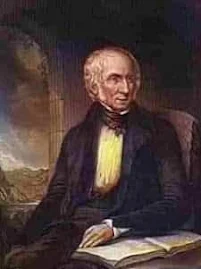Wordsworth view on poetic diction in Preface to Lyrical Ballads
The term "genius" stands for a person having innate quality and strong morale for establishing new ideas. They endeavour due to that very "giddy haunt" of some kind of belief within their inner-selves which does not conform with the prevailing antiquated concepts. A true genius is bound to rebel in this manner. Their rebellion comes in the forms of new ideas of creations.
The genius, William Wordsworth also, is no exception to this truth. The Lyrical Ballads has been composed by him as a sequel to such a type of rebellion. Wordsworth was utter dissatisfied with the poetic tradition of the eighteenth century. His Preface to Lyrical Ballads is one of the revolutionary works of criticism. In spite of its many confusing passages, it announces the advent of the Romantic Age in literature.
In the Preface, Wordsworth is found at variance with the Neo-Classical and Augustan poets regarding the concept of poetry. He is against the tradition and usages employed by the "pseudo-classical group" of the eighteenth century. His basic objection is about the LANGUAGE used to compose poetry. His very close associate Coleridge also disagrees with him at this very point.
Wordsworth commences his discussion on his own poetic diction employed in the Preface through the following statement:
There will also be found in these volumes little of what is usually called poetic diction.
Wordsworth "rakes much pain" to avoid the then-popular poetic diction. And in the same breath clarifies his cause behind this deviation. He does this-
To bring his language near to the language of men.
Secondly, he attempts to express his own feelings and experiences in poems in those a manner that those poems remain utter emancipated from "false descriptions." So, he feels his ideas sho be expressed in LANGUAGE-
fitted to their respective importance.
But, such a type of novelty in ideas has gifted him with a good- sense; and this very sense disinherits him of a number of cliched words and phrases those-
Have long been regarded as the common inheritance of Poets.
He is also resolved to discard the beautiful expressions use unthought-of by the poets. Wordsworth's next advocacy is in favour of PROSAISM. He quotes from Gray to show that the language of Prose may yet be well adapted to poetry.
On the other hand, a large portion of the language of every good poem can in no respect differ from that of good prose So, he concludes that-
There neither is nor can be, any essential difference between the language of prose and metrical composition.
At the same time, Wordsworth agrees with the Aristotelian view that-
Poetry is the most philosophic of all writing
Again, "all good poetry", to him, "is the spontaneous overflow of powerful feelings," while a dignified poet writes under one restriction only-he must render immediate pleasure to a man and as a man only and not as a lawyer, a physician, a mariner, an astronomer, or a natural philosopher.
This very task of "producing immediate pleasure" by the poet's creation should not be regarded as a degradation of the Poet's at, rather, the beauty of the universe is acknowledged in a more sincere but indirect manner by the poet.
Any avid reader must apprehend that Wordsworth is too enthusiastic to set up a new theory of poetry in his PREFACE. Still, his composition is full of repetitions and again is not at all free from weaknesses and confusing ideas. Above all, he himself exposes self- contradiction at the time of writing poems of true merit. The main principles of his theory of poetic diction are-
1. Especially selected words of conversation used by the commonplace rustic people should be the language of Poetry.
2. A good poem should be purged of "adulterated phraseology" through the employment of the parlance of common people.
3. So, the diction used in poetry must be chosen from the language of the commoners.
4. Past experiences should be represented in poetry being amalgamated with imagination.
5. There is no "essential difference" between the language of prose and that of metrical composition.
It is a striking fact that Wordsworth himself is found not to adhere to this theory at the time of composing his superb creations like Ode to Duty, Laodamia, Ode: Intimations of Immortality from Recollections of Early Childhood, Lines Composed a Few Miles Above Tintern Abbey, etc. His own theory has been followed in some of his insignificant poems.
Again, his claim regarding the semblance between the language of prose and poetry has been thoroughly violated by him in the aforesaid poems of high poetic grandeur. Thus, Wordsworth represents himself as a kind of an enigma to a naive reader. His enigmatic entity has aptly been unfolded by Raleigh:
It has been argued that when he writes, he breaks his own rules, and when he writes ill, it has been implied, he keeps them. But the fact is he hardly ever observes his own rules and the poems in which he most nearly observes them are often among his best.
The greatest paradox in Wordsworth's works lies in the fact that he himself writes in verse as well as in words of high poetic grandeur while he exerts stress upon the naturalness of poetry and the emotional force behind the creation of poetry; shuns the old mechanical rules; and rejects the artificial language of the Neo-Classical poets.




